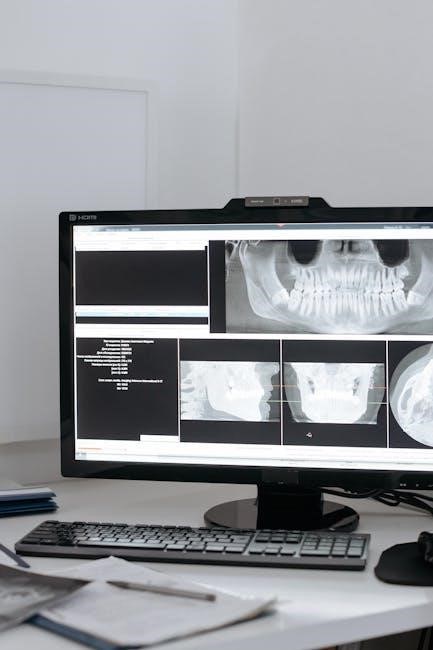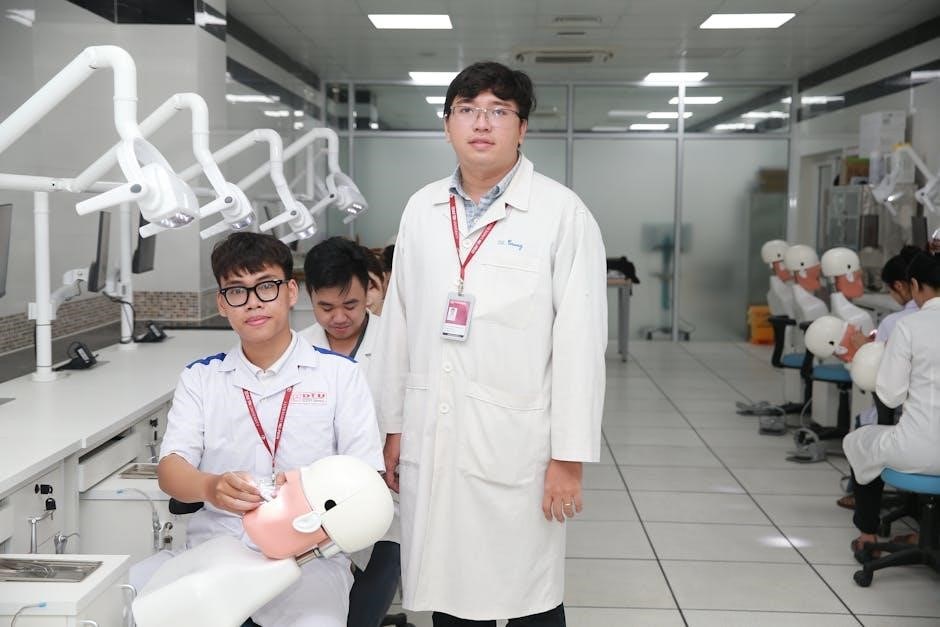Dental front desk training is essential for ensuring efficient office operations and exceptional patient care. This manual provides a comprehensive guide to mastering front desk responsibilities effectively.
1.1 The Importance of Front Desk Staff in Dental Offices
The front desk staff plays a vital role in dental offices, serving as the first point of contact for patients. They manage appointments, handle patient intake, and ensure seamless communication between patients and dental teams. Their efficiency and professionalism directly impact patient satisfaction, office workflow, and overall practice success. A well-trained front desk team is essential for creating a positive patient experience and maintaining operational excellence.
1.2 Overview of the Dental Front Desk Training Manual
This manual is a comprehensive resource designed to equip dental front desk staff with the essential skills and knowledge needed for success. It covers key areas such as patient communication, scheduling, insurance handling, and office management. The guide provides practical tips, real-world scenarios, and step-by-step instructions to ensure staff can efficiently manage daily tasks while delivering exceptional patient care and maintaining smooth office operations.
Key Skills and Responsibilities of Dental Front Desk Staff
Dental front desk staff must possess strong multitasking, organizational, and interpersonal skills to manage patient interactions, scheduling, and administrative tasks efficiently, ensuring smooth office operations and patient satisfaction.
2.1 Communication Skills for Patient Interaction
Effective communication is crucial for dental front desk staff to build trust and ensure patient satisfaction. Clear, empathetic, and professional interactions help address patient concerns, clarify treatments, and provide reassurance. Active listening, maintaining eye contact, and adapting communication style to patient needs are key. This fosters a positive environment, enhances patient understanding, and strengthens the practice-patient relationship.
2.2 Time Management and Organizational Techniques
Effective time management and organizational skills are vital for dental front desk staff to handle multiple tasks efficiently. Prioritizing duties, using calendars, and minimizing distractions help maintain workflow. Implementing systems for tracking appointments, paperwork, and patient records ensures accuracy and reduces delays. Staying organized enables staff to respond promptly to patient needs, manage stress, and maintain a smooth, productive environment for optimal patient care and office efficiency.
2.3 Handling Patient Data and Confidentiality
Confidentiality is paramount when handling patient data. Front desk staff must adhere to HIPAA regulations and ensure patient records are stored securely. Access to sensitive information should be restricted to authorized personnel only. Best practices include using encrypted digital systems, verifying patient identities before releasing information, and training staff to recognize potential breaches. Maintaining confidentiality builds trust and protects both patients and the practice from legal complications.
Patient Experience and Satisfaction
The front desk plays a crucial role in shaping patient experience and satisfaction by creating a welcoming environment and ensuring seamless visit processes, making patients feel valued.
3.1 Creating a Positive First Impression
Creating a positive first impression is vital for patient satisfaction. A warm, professional greeting, a clean environment, and a friendly demeanor set the tone for a welcoming experience. Ensuring the waiting area is organized and comfortable enhances patient comfort. Front desk staff should be approachable, dressed neatly, and prepared to address patient needs promptly, fostering trust and confidence from the moment patients arrive.
3.2 Managing Patient Intake and Registration
Efficiently managing patient intake and registration is crucial for a smooth dental office workflow. This process involves gathering accurate patient information, verifying insurance details, and completing necessary forms. Front desk staff should ensure all data is entered correctly into the system. A well-organized intake process reduces delays, minimizes errors, and ensures a seamless experience for both patients and staff, setting the foundation for effective patient care.
3.3 Ensuring Patient Comfort and Satisfaction
Ensuring patient comfort and satisfaction begins with a welcoming environment and attentive service. Front desk staff should greet patients warmly, offer amenities, and address concerns promptly. Maintaining a clean and comfortable waiting area enhances patient experience. Clear communication about procedures and wait times reduces anxiety. Listening to feedback and resolving issues quickly demonstrates commitment to patient satisfaction, fostering loyalty and positive reviews for the dental practice.
Insurance and Billing Procedures
Insurance and billing procedures are crucial for seamless patient transactions. This section covers understanding insurance plans, processing claims, and managing payments efficiently.
4.1 Understanding Dental Insurance Plans
Understanding dental insurance plans is vital for accurate billing and patient communication. Front desk staff must know coverage details, deductibles, and limitations to ensure proper reimbursement and patient satisfaction.
4.2 Processing Claims and Payments
Processing claims and payments efficiently is crucial for dental practices. Front desk staff must accurately submit claims, verify insurance coverage, and manage patient payments promptly. Clear communication about financial responsibilities and regular follow-ups on unpaid claims ensure smooth operations and patient satisfaction.
4.4 Handling Insurance Verification and Denials
Accurate insurance verification is vital to avoid claim denials. Front desk staff must confirm coverage details before treatment and review denied claims to identify issues. Resubmitting corrected claims and communicating clearly with patients ensures timely resolution and maintains trust. Regular follow-ups with insurance providers help minimize delays and improve office efficiency.
Scheduling and Appointment Management
Effective scheduling is crucial for smooth dental office operations. Front desk staff must efficiently manage appointments, ensuring optimal use of time and minimizing patient wait times for better productivity.
5.1 Best Practices for Scheduling Appointments
Scheduling appointments effectively requires verifying patient availability, using dental software, and prioritizing urgent cases. Allocate time slots based on procedure lengths and ensure clear communication of dates and times. Send reminders to reduce no-shows and balance the schedule to avoid overbooking. Regularly review and adjust the schedule to maintain efficiency and accommodate unexpected changes, ensuring smooth workflow and patient satisfaction.
5.2 Managing Cancellations and No-Shows
Effectively managing cancellations and no-shows involves promptly rescheduling appointments and maintaining open communication with patients. Send reminders to confirm attendance and keep a waiting list for last-minute openings. Document cancellation reasons to identify patterns and improve scheduling strategies. Offer alternative solutions, such as virtual consults, to accommodate patients and minimize lost revenue. Stay empathetic and professional to preserve patient relationships and ensure smooth office operations.
5.3 Optimizing the Dental Office Schedule
Optimizing the dental office schedule involves analyzing appointment patterns and balancing patient flow. Group similar procedures, allocate sufficient time for complex cases, and leave buffers for unexpected emergencies. Implement scheduling templates and leverage practice management software to track availability. Consider patient preferences for morning or afternoon slots and ensure adequate breaks for staff. Regularly review and adjust the schedule to maximize efficiency, reduce wait times, and enhance overall patient satisfaction.

Technology and Software Utilization
Technology and software are cornerstone tools for modern dental practices, streamlining operations and enhancing patient care. Dental practice management software improves scheduling, billing, and data management efficiency, ensuring seamless workflows and better patient outcomes.
Dental practice management software is a cornerstone of modern dental offices, streamlining operations and improving efficiency. It integrates patient records, scheduling, billing, and insurance claims into one platform. Key features include appointment management, automated reminders, and real-time data access. This software enhances communication, reduces errors, and improves patient satisfaction. Front desk staff rely on it to manage daily tasks effectively, ensuring smooth workflows and compliance with regulatory requirements. Proper training is essential to maximize its benefits and optimize office performance.
6.2 Using Electronic Health Records (EHR)
Electronic Health Records (EHR) are digital versions of patient medical histories, enhancing care coordination and accessibility. EHR systems store patient data securely, streamline documentation, and improve communication between healthcare providers. Front desk staff use EHR to update patient information, manage appointments, and track treatment plans. Proper training ensures accurate data entry, compliance with HIPAA, and efficient workflow. EHR integration is vital for modern dental practices, improving patient care and office efficiency significantly.
6.3 Mastering Front Desk Specific Software Features
Front desk software offers tailored tools for scheduling, billing, and patient communication. Mastering features like appointment reminders, payment processing, and patient engagement can enhance efficiency. Regular practice and tutorials help staff optimize these tools, reducing errors and improving patient satisfaction. Understanding advanced features ensures seamless workflow, enabling the front desk to manage tasks effectively and maintain a smooth patient experience.

Compliance and Legal Considerations
Compliance and legal considerations are crucial for dental front desk staff to ensure adherence to regulations, protect patient data, and maintain trust in the practice.
7.1 Understanding HIPAA Regulations
Understanding HIPAA regulations is critical for dental front desk staff to ensure patient data privacy. HIPAA mandates strict guidelines for handling protected health information (PHI), requiring confidentiality, integrity, and availability. Front desk staff must adhere to these rules to avoid legal consequences, ensuring all patient interactions and record-keeping comply with federal standards. Proper training and awareness are essential to maintain patient trust and avoid breaches.
7.2 Maintaining Patient Confidentiality
Maintaining patient confidentiality is a cornerstone of dental front desk responsibilities. Front desk staff must ensure all patient information, including medical records and personal details, remains secure. Access to patient data should be restricted to authorized personnel only. Proper training on HIPAA guidelines and office protocols is essential to prevent unauthorized disclosure. Regular reminders and updates on confidentiality practices help reinforce the importance of safeguarding patient privacy at all times.
7.3 Adhering to OSHA Guidelines
Adhering to OSHA guidelines is critical for ensuring a safe and healthy work environment in dental offices. Front desk staff must familiarize themselves with OSHA standards, including proper handling of biohazardous materials, use of personal protective equipment (PPE), and infection control protocols. Regular training and updates on OSHA regulations help prevent occupational hazards and maintain compliance. Non-compliance can result in penalties, making it essential for all staff to follow these guidelines diligently.

Soft Skills for Effective Front Desk Operations
Soft skills like empathy, patience, and adaptability are essential for front desk staff to create a welcoming environment, ensuring smooth and effective patient interactions daily.
8.1 Building Strong Team Relationships
Building strong team relationships is crucial for a harmonious and productive dental office environment. Open communication, active listening, and mutual respect foster trust among staff. Collaboration and teamwork ensure seamless patient care and operational efficiency. Encouraging a positive and supportive atmosphere helps reduce conflicts and boosts morale, leading to a more cohesive and effective front desk team. Strong relationships also enhance problem-solving and adaptability, benefiting both staff and patients.
8.2 Managing Stress and Burnout
Managing stress and burnout is vital for maintaining productivity and well-being in a fast-paced dental front desk environment. Prioritizing tasks, taking short breaks, and practicing mindfulness can help reduce tension. Encouraging open communication and seeking support from colleagues or supervisors fosters a supportive workplace culture. Balancing workload and personal time, along with adopting stress-relief techniques, can prevent burnout and enhance overall job satisfaction and performance.
8.3 Continuous Learning and Professional Development
Continuous learning and professional development are crucial for dental front desk staff to stay updated on industry trends and best practices. Engaging in workshops, webinars, and certifications enhances skill sets and confidence. Regular feedback sessions and self-assessment help identify growth areas. Dedicate time weekly to learn new software, patient communication techniques, and office efficiency strategies to remain competitive and provide exceptional service in a dynamic healthcare environment.

Marketing and Patient Engagement
Effective marketing and patient engagement strategies are vital for practice growth. Front desk staff play a key role in promoting services, building patient relationships, and fostering loyalty through excellent communication and personalized care.
9.1 Basic Marketing Concepts for Front Desk Staff
Understanding basic marketing concepts is crucial for front desk staff to promote dental services effectively. This includes personalized patient communication, leveraging social media, and highlighting promotions. By engaging patients, staff can build loyalty and attract new patients through positive word-of-mouth and online reviews, ultimately contributing to practice growth and a strong community presence.
9.2 Role of Front Desk in Patient Retention
The front desk plays a vital role in patient retention by ensuring a welcoming environment, effective communication, and personalized care. Staff should greet patients warmly, address concerns promptly, and maintain clear communication. Following up with patients post-appointment and managing recall schedules helps build trust and satisfaction, fostering long-term patient relationships and loyalty to the practice.
9.3 Promoting Dental Services and Treatments
Front desk staff play a key role in promoting dental services by educating patients about available treatments and their benefits. They can highlight special offers, explain treatment options, and distribute informative materials. Using verbal communication, visual aids, and digital tools, they can effectively showcase services. Understanding patient needs and making personalized recommendations enhance trust and satisfaction. A knowledgeable and enthusiastic front desk team can significantly boost patient engagement and practice growth.
Effective dental front desk training empowers staff to enhance patient care, streamline operations, and drive practice success. Continuous learning ensures long-term growth and improved patient satisfaction.
10.1 Recap of Key Takeaways
This manual emphasized the critical role of front desk staff in dental offices, covering essential skills like communication, time management, and patient data handling. It highlighted the importance of creating a positive patient experience, mastering insurance and scheduling processes, and leveraging technology effectively. Additionally, it stressed compliance with legal standards and the value of soft skills like teamwork and continuous learning to ensure office efficiency and patient satisfaction.
10.2 Encouraging Ongoing Training and Improvement
Ongoing training is crucial for front desk staff to stay updated on best practices, software, and patient care strategies. Regular workshops, online courses, and feedback sessions can enhance skills and adaptability. Encouraging a culture of continuous improvement ensures the team remains efficient, knowledgeable, and patient-focused, ultimately benefiting the entire dental practice.
Additional Resources and References
Explore additional resources like industry manuals, online courses, and professional associations for further learning. Websites and forums dedicated to dental front desk best practices are invaluable.
11.1 Recommended Reading and Tools
Enhance your knowledge with books like “The Front Desk Survival Guide” and “Dental Office Administration”. Utilize online platforms offering courses on patient communication and billing. Software tools like Eaglesoft and Dentrix are essential for streamlining operations. Explore ADA resources for updated protocols and best practices. These tools will help you stay informed and efficient in your role.
11.2 Websites and Forums for Dental Front Desk Staff
Stay informed with resources like the American Dental Association and DentalTown. Explore forums like DentalBlogs for industry insights. Utilize AADOM for office management tips. These platforms offer valuable knowledge, networking opportunities, and practical tools to enhance your front desk skills and stay updated on dental administrative trends.

